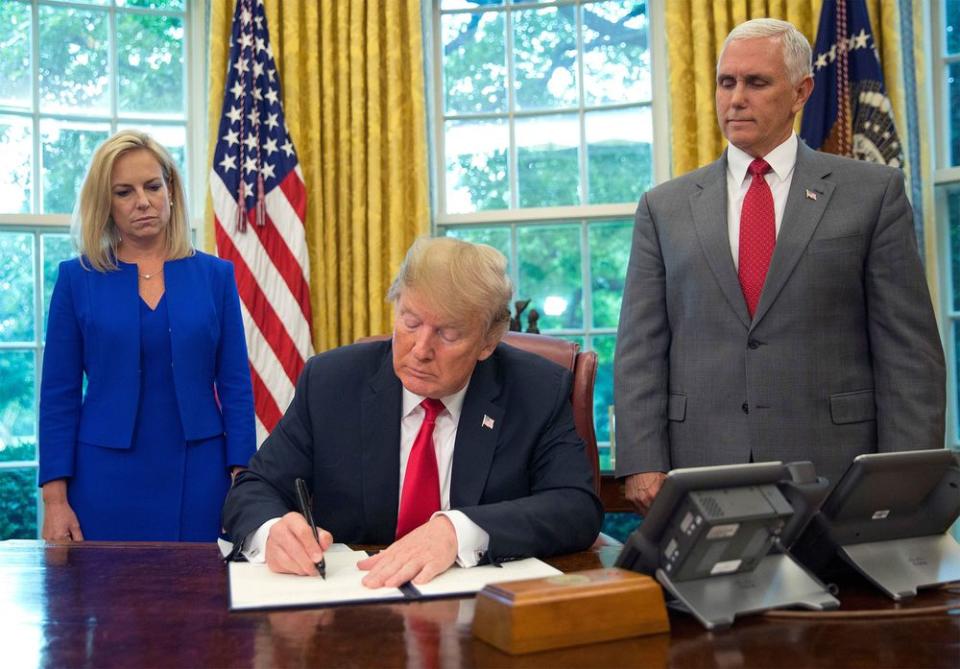Will Migrant Children Be Reunited with Their Parents? An Immigration Attorney Explains
Following international backlash, President Donald Trump signed an executive order on Wednesday reversing his administration’s policy of separating migrant children from their parents illegally crossing the Southern U.S. border.
While Trump’s order said the government would maintain a “zero tolerance” policy for illegal entry into the country, a senior U.S. official told The Washington Post on Thursday that Border Patrol agents have been told to stop referring parents with children for prosecution.
Now, many are wondering what will become of the children who have already been separated from their parents. Will the families be reunited? And if so, how and when?
Since May, Trump’s “zero tolerance policy” has resulted in 2,342 children being removed from their parents who crossed the Southern border and face prosecution for illegal entry.
Immigration attorney Richard Jurgens, a member of the Florida Bar and the American Immigration Lawyers Association who has practiced immigration law for more than 13 years, tells PEOPLE the government has no plan for reuniting the immigrant families it has torn apart.
Here’s what we’ve learned so far from Jurgens:
Q: What does Trump’s executive order mean for the families that have already been separated?
A: Nothing in the executive decree that was signed indicates that it will be applied retroactively. In fact, families that have already been separated are not addressed in the order at all.
Trump’s solution moving forward is to keep the children and families/parents in detention together. The problem with that: the Flores settlement.

Q: What is the Flores settlement?
A: Though federal law does not require family separation at the border, the Flores settlement, a 1997 court order, states that children can not be detained by immigration for more than 20 days.
However, Trump’s decree does not address what will happen to the children, deemed “unaccompanied,” after the 20th day.
Q: If a parent has already been deported back to his or her country, what happens to the child/children?
A: As in most cases, the children are placed in shelters run by the U.S Department of Health and Human Services because they do not have a U.S. relative to be released to.
They will stay at the shelters until either they reach the age of majority (the age where one is considered to be an adult).
Q: What if a 2-year-old has been separated from his or her parent, where does that 2-year-old go?
A: A 2-year-old cannot represent him or herself. As a result, babies, “tender age” children (under 13) and children with special needs who have not been released to a U.S. relative have been sent to so-called “tender age” facilities in Texas.
If the 2-year-old is released to a U.S. relative, the family member is responsible for seeing the child through the proper immigration court process. If there is an application that can be filed on their behalf, it is done by the U.S. relative.
Q: How do the shelters keep track of the children?
A: The children do not wear any bracelets or name tags. They are broken up into groups so that the youngest does not have contact with the eldest unaccompanied minor. The exception is if an older juvenile is the sibling or cousin of the younger child.
Some parents make sure that the child has a birth certificate on them. When the parent and children are encountered prior to the separation, the immigration officer prepares a document called an I-213 Record of Deportable/Inadmissible Alien. All of the biographical information and information in reference to the encounter with immigration is taken and a document is created. Usually, they also take photos and then the Alien File is created and at that point, each alien is assigned a unique number.

Q: Does a parent need legal representation to be reunited with his or her child?
A: The thing with immigration proceedings in general: People don’t have the right to have counsel appointed for you like in a public defender situation. People have the right to find counsel, that’s it.
They can always find counsel but realistically, it is very difficult. A lot of these detention facilities are very remote with limited resources.
It doesn’t mean “no” to representation. It means it makes it more difficult for them to get representation because people can’t afford an attorney to go out to these remote spots.
Q: What is the first step parents — who have been released from federal or immigration custody — can do to begin the reunification process for their children?
A: If parents are released, they can call the 1-800 hotline set up by the Office of Refugee Resettlement. What needs to be given is the child’s name, date of birth and country of birth.
Nonprofit agencies have been doing a very good job of sending in lawyers, even if they can’t take on every case pro bono. They can at least do a pre-representation to at least provide some guidance.

